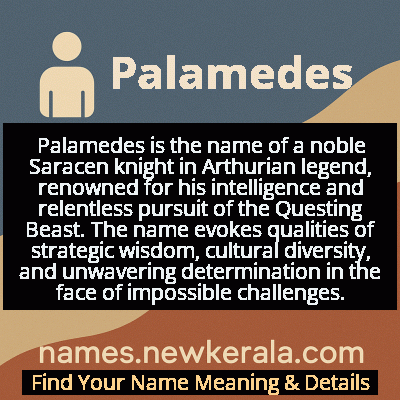Palamedes Name Meaning & Details
Origin, Popularity, Numerology Analysis & Name Meaning of Palamedes
Discover the origin, meaning, and cultural significance of the name PALAMEDES. Delve into its historical roots and explore the lasting impact it has had on communities and traditions.
Name
Palamedes
Gender
Male
Origin
Arthurian
Lucky Number
4
Meaning of the Name - Palamedes
Palamedes is the name of a noble Saracen knight in Arthurian legend, renowned for his intelligence and relentless pursuit of the Questing Beast. The name evokes qualities of strategic wisdom, cultural diversity, and unwavering determination in the face of impossible challenges.
Palamedes - Complete Numerology Analysis
Your Numerology Number
Based on Pythagorean Numerology System
Ruling Planet
Uranus (Rahu)
Positive Nature
Strong sense of order, loyal, practical, and disciplined.
Negative Traits
Stubborn, overly serious, rigid, and prone to feeling restricted.
Lucky Colours
Blue, gray.
Lucky Days
Saturday.
Lucky Stones
Blue sapphire.
Harmony Numbers
1, 7, 8.
Best Suited Professions
Managers, engineers, accountants, organizers.
What People Like About You
Dependability, discipline, practicality.
Famous People Named Palamedes
Palamedes
Arthurian Knight
One of the most prominent Saracen knights of the Round Table, known for his quest for the Questing Beast
Palamedes
Greek Mythology Figure
Inventor of letters, numbers, dice, and military ranks in Greek mythology
Palamedes de Charolais
Historical Knight
French knight who fought in the Hundred Years' War, known for his military prowess
Name Variations & International Equivalents
Click on blue names to explore their detailed meanings. Gray names with will be available soon.
Cultural & Historical Significance
The character bridges Eastern and Western chivalric traditions, reflecting the medieval fascination with the exotic and the universal appeal of knightly virtues across cultural boundaries. Palamedes' story also explores themes of religious conversion, cultural integration, and the complex nature of honor and loyalty in a multicultural context. His presence in Arthurian literature demonstrates how medieval writers incorporated diverse elements into their narratives, creating characters that challenged contemporary religious and cultural assumptions while upholding the core values of chivalry.
Extended Personality Analysis
Palamedes is typically characterized by exceptional intelligence, strategic thinking, and unwavering loyalty. As depicted in Arthurian literature, he possesses a keen analytical mind that allows him to solve complex problems and devise clever strategies in battle and diplomacy. His personality combines the fierce warrior spirit with intellectual depth, making him both a formidable combatant and a wise counselor. The knight demonstrates remarkable perseverance, particularly in his relentless pursuit of the Questing Beast, showing determination that borders on obsession.
Despite his Saracen origins, Palamedes exhibits the core chivalric virtues of honor, courage, and fidelity, earning respect from his Christian peers through his noble conduct and martial prowess. His character often displays emotional complexity, particularly in his unrequited love for Iseult and his complicated friendship-rivalry with Tristan, revealing a man torn between duty, honor, and personal desire. This psychological depth makes him one of the most nuanced characters in Arthurian legend, embodying the internal conflicts that define the human experience within the framework of knightly ideals.
Modern Usage & Popularity
In contemporary times, Palamedes remains an extremely rare given name, primarily used by enthusiasts of Arthurian literature and medieval history. The name sees occasional usage in fantasy literature and gaming communities, where its exotic and noble connotations appeal to parents seeking unique names with historical depth. It has never appeared on popular baby name charts in English-speaking countries, maintaining its status as an obscure but culturally rich choice. The name's complexity and strong association with specific Arthurian lore limit its mainstream appeal, though it occasionally surfaces in academic circles or among families with particular interest in medieval studies. Its usage is more common in Italy and France, where the variants 'Palamede' have slightly greater historical presence.
Symbolic & Spiritual Meanings
Palamedes symbolizes the pursuit of impossible quests and the integration of diverse cultures within a unified ideal. His eternal chase of the Questing Beast represents humanity's endless search for meaning and the knightly virtue of perseverance against overwhelming odds. As a Saracen knight in a Christian court, he embodies the reconciliation of opposing traditions and the universal nature of chivalric values. The character also represents intellectual knighthood—the combination of martial prowess with wisdom and strategic thinking. His story carries themes of unrequited love, religious conversion, and the complex interplay between personal desire and knightly duty, making him one of the most psychologically nuanced figures in Arthurian legend who continues to resonate as a symbol of cultural bridge-building and determined pursuit of noble goals.

